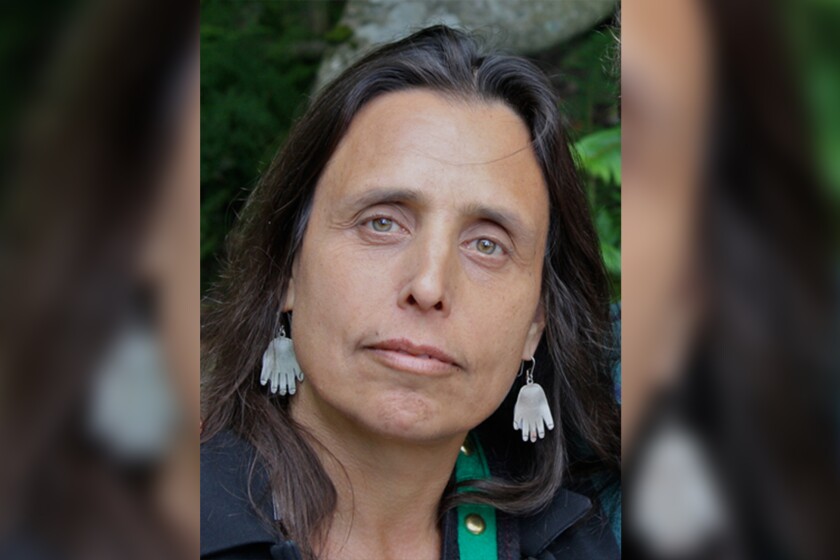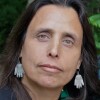Waasibiik. That’s the word in Anishinaabemowin for the sparkle on the water. I love to look at the sparkling water, full of life. I have been wondering if people elsewhere in the world can see the sparkle and waasibiik.
The Shell River starts at Shell Lake, where a great heron watches. Pristine, we can drink the water there.
Then the Minnesota DNR begins to illustrate mismanagement. I’ve been watching the river fall steadily, and as businesses and farmers on the Hubbard Prairie run those irrigators all day and night, the river dropped 8 inches in a day.
The rivers and lakes are low. It’s the driest and hottest year we can remember, and the Minnesota Department of Natural Resources gave Enbridge 630 million gallons of water to blow through its pipes, and drain out of wetlands. And approved deep-well irrigation permits for farmers for at least as much .
Who gets the water, the fish or the companies? That’s really a question. There’s a lot of mathematical modeling in these approvals, but those scientific models are not out here on the river or lake in the second year of a terrible drought. The agencies are out of touch.
ADVERTISEMENT
There’s more that unites us than divides us. That’s the truth. I come from a family which lives off the land, maybe about half our food or more is from local harvests: fish, fiddleheads, berries, wild rice, and then the gardens, many of corn, and more. There’s wild rice for all of us.
My color may be different, I may articulate things in a way which some may not, but we all drink the same water, fish from the same rivers, and live in this same place — omaa akiing, omaa indakiingimin — here on the very land to which we belong. Even Proud Boys. I think that’s worth protecting: This water and this place.
In 1706, before the treaties and agreements with the Dutch, English and Americans, my Anishinaabe ancestors made an agreement with the Iroquois confederacy. That is called the One Dish, One Spoon treaty, a treaty where we understood that we would all eat from the same dish — this land, and we would share the same spoon — at that time a big wooden spoon, feeding each other as relatives. When our ancestors signed the 1855 treaty, there were still buffalo in Minnesota, you could drink the water from every stream and lake, fish and animals were abundant, and passenger pigeons still darkened the skies.
That’s the world we are supposed to have: The one, we have to protect, and the one which we can recover.
There are different times, the great dish we live from- the land, is suffering from big agriculture, the forests being clear cut for industrial agriculture expansions, and the water withdrawals continue. Now add Enbridge.
Think about this, Enbridge is about to cross almost every river in Hubbard County — well at least the Straight River, Hay Creek, Shell River, Crow Wing, and put more risk into our waters, as well as sucking out more to make their mess. Our world is fragile.
They kill rivers don’t they?
Let me be clear, a corporation can kill a river. In 2010, Enbridge didn’t help the Kalamazoo River at all by letting the oil blast out for 17 hours before they noticed. In 2017, three mining disasters killed some rivers: the Animas River in Colorado, Brazil’s Rio Doco River disaster in 2017 sent a toxic sludge of dense orange sediment down the river and Mount Polymet in British Columbia had a mining disaster and killed a river with toxics. A couple of years ago, the Columbia River lost a huge salmon population to the water temperatures. We face all this now in the north country.
ADVERTISEMENT
It’s 300 years after my ancestors signed those first treaties with the Iroquois and 150 years after that treaty of 1855. These are different times, but we all eat from the same land, drink the same water, and breathe the same air. Political divisions mean little to me, I just want to know if you want to drink the water.
I have been asked this past week if I’m a protester. I’m not. I’m Anishinaaabe and I am a water protector, because the water of the rivers and lakes of this land, the 1855 treaty territory, is of more value to me than oil and money. And there are millions more like me. In fact, I think a lot of them are coming, and they are all ages (Hubbard County, in the 165 or so arrests, took a lot of old people into custody), and they are here for the water. We all are.
Big agriculture and big oil take a toll on our water, and on our civil society. There’s plenty of fear, way too many security forces paid for by a Canadian multinational who wants to make a buck at the end of the tar sands oil party.
Waasibiik. That’s my granddaughters’ name. That’s a gift not to be taken for granted. Let the water shine.
Winona LaDuke is executive director, Honor the Earth, and an Ojibwe writer and economist on Minnesota’s White Earth Reservation. She is also owner of Winona's Hemp and a regular contributor to Forum News Service.








